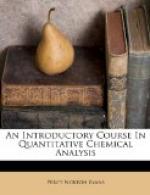The graduations are usually numbered in cubic centimeters, and the latter are subdivided into tenths.
One burette of each type is desirable for the analytical procedures which follow.
PREPARATION OF A BURETTE FOR USE
The inner surface of a burette must be thoroughly cleaned in order that the liquid as drawn out may drain away completely, without leaving drops upon the sides. This is best accomplished by treating the inside of the burette with a warm solution of chromic acid in concentrated sulphuric acid, applied as follows: If the burette is of the “plain” type, first remove the rubber tip and force the lower end of the burette into a medium-sized cork stopper. Nearly fill the burette with the chromic acid solution, close the upper end with a cork stopper and tip the burette backward and forward in such a way as to bring the solution into contact with the entire inner surface. Remove the stopper and pour the solution into a stock bottle to be kept for further use, and rinse out the burette with water several times. Unless the water then runs freely from the burette without leaving drops adhering to the sides, the process must be repeated (Note 1).
If the burette has a glass stopcock, this should be removed after the cleaning and wiped, and also the inside of the ground joint. The surface of the stopcock should then be smeared with a thin coating of vaseline and replaced. It should be attached to the burette by means of a wire, or elastic band, to lessen the danger of breakage.
Fill the burettes with distilled water, and allow the water to run out through the stopcock or rubber tip until convinced that no air bubbles are inclosed (Note 2). Fill the burette to a point above the zero-point and draw off the water until the meniscus is just below that mark. It is then ready for calibration.
[Note 1: The inner surface of the burette must be absolutely clean if the liquid is to run off freely. Chromic acid in sulphuric acid is usually found to be the best cleansing agent, but the mixture must be warm and concentrated. The solution can be prepared by pouring over a few crystals of potassium bichromate a little water and then adding concentrated sulphuric acid.]
[Note 2: It is always necessary to insure the absence of air bubbles in the tips or stopcocks. The treatment described above will usually accomplish this, but, in the case of plain burettes it is sometimes better to allow a little of the liquid to flow out of the tip while it is bent upwards. Any air which may be entrapped then rises with the liquid and escapes.
If air bubbles escape during subsequent calibration or titration, an error is introduced which vitiates the results.]




